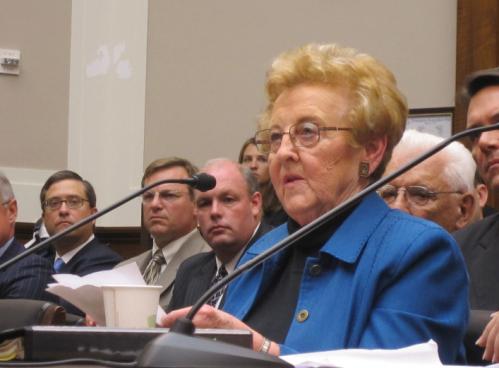|
Opening Statement
Congressman Edward J. Markey (D-MA)
Oversight and Investigations Subcommittee hearing
The Outbreak of Salmonella in Eggs
September 22, 2010
Thank you very much Mr. Chairman for calling today’s hearing.
I would like to begin by thanking the witnesses on our first panel, victims sickened by the neglect that led to the salmonella contamination, for being here today. I wish you a speedy and full recovery from this debilitating and life-threatening experience. 
We can all easily agree that Americans should be able to have their eggsover-easy, without having to worry that the eggs will make them queasy.
Butmore than a thousand people have been severely sickened by eggs laced with salmonella since the eggs first entered the food chain in May. Morethan half a billion eggs have been voluntarily recalled since August. As we have learned, the conditions found in the facilities connected to these eggs were horrific – like something out of Upton Sinclair’s “The Jungle.”
It is my fear that this recall may not be the end of the story. There are many egg processing facilities in other States withstrong corporate ties to the companies responsible for the Iowa recall that have not yet been inspected by FDA. And with Senator Tom Coburn’s recent announcement of opposition to the Senate Food Safety bill, FDA may well continue to be denied the strong enforcement tools it needs to crack down on unsafe practices that the House passed last year, leaving the corporate fox in charge of the hen-house indefinitely.
This past July, the FDA’s new egg rule went into effect, imposing additional safety requirements on large egg producers and ensuring that there will be more FDA inspections of the facilities. But these inspections only began earlier this month. So the jury is still out as to whether the Iowa facilities implicated in this infestation represent just a few rotten eggs, or whether the safety of this country’s egg supply is more like Humpty Dumpty - shattered and in need of full-scale reconstruction.
Accordingto reports, companies owned or operated by one of our witnesses today have a decades-long record of public health, labor, and environmental offenses. DeCoster egg and feed facilities in Maine and other states have a long history of being found to be responsible for salmonella infections, dumping piles of dead chickens above ground, animal cruelty,worker safety violations and other problems. Instead of walking on egg-shells to comply with state and federal regulations, the hard-boiledcorporate executives in Iowa kept facilities that inspections showed were overflowing with manure and infested by rodents and flies.
Myhome state of Massachusetts gets many of its eggs from Maine facilitiesowned or operated by or otherwise tied to Mr. DeCoster. Some of these business-owners merely rent land from Mr. DeCoster, and their reputations and businesses may have been unfairly tarnished by his actions in Iowa. Others may have closer operational ties, such as using the same feed as other DeCoster facilities. It turns out that the business and operational relationships within the egg industry are oftenscrambled and hard to understand.
While no Maine facilities have been linked to this outbreak, I will want to know from our corporate witnesses what they plan to do to clean up their act in all the facilities in which they have a stake. I will also want to know whatFDA plans to do to accelerate and prioritize inspections at facilities that have been found to be out of compliance in the past, or that share business or operational practices with other known violators. I look forward to hearing from our witnesses. ### 
Witness, Carol Lobato, describes her experience as a victim of the salmonella outbreak.  Witness, Sarah Lewis, describes her battle with salmonella after eating contaminated eggs. 
Witness, Joshua M. Sharfstein, M.D., Principal Deputy Commissioner, Food and Drug Administration, testifies before the committee. |















